|
Books Should Be Free Loyal Books Free Public Domain Audiobooks & eBook Downloads |
|
|
Books Should Be Free Loyal Books Free Public Domain Audiobooks & eBook Downloads |
|
History Books |
|---|
|
Book type:
Sort by:
View by:
|
By: Georg Ebers (1837-1898) | |
|---|---|
 The Sisters
The Sisters
| |
 The Emperor
The Emperor
| |
 Serapis
Serapis
| |
 Joshua
Joshua
Hosea is a commander in Pharaoh's army... and a Hebrew. As he returns home from war, he finds that there has been a great pestilence in Egypt and his people are being blamed for it. Hosea receives a message from his father to follow his people to Succoth, but he is hesitant to give up his position in the army. Someone else also sends a message, containing a new name for him from God. There is much intrigue in this retelling of the Exodus, both among the Hebrews and in the court of Pharaoh. | |
 A Thorny Path
A Thorny Path
| |
 The Burgomaster's Wife
The Burgomaster's Wife
| |
 Barbara Blomberg
Barbara Blomberg
| |
 A Word, Only a Word
A Word, Only a Word
| |
By: Georg Jellinek (1851-1911) | |
|---|---|
 The Declaration of the Rights of Man and of Citizens
The Declaration of the Rights of Man and of Citizens
| |
By: George A. (George Alfred) Lawrence (1827-1876) | |
|---|---|
 Border and Bastille
Border and Bastille
| |
By: George A. Birmingham (1865-1950) | |
|---|---|
 The Northern Iron
The Northern Iron
| |
 A Padre in France
A Padre in France
| |
By: George A. Miller (1868-1961) | |
|---|---|
 Prowling About Panama
Prowling About Panama
In 1903, Panama became a brand new state in Central America by seceding from Colombia in order to facilitate the construction of the Panama Canal, which was finished in 1914. This fledgling nation was home to the oldest inhabited European settlement on the American continent, a rich indigenous culture, and a splendid natural beauty from coast to jungle. Such was the scene as found by George A. Miller as he was "Prowling about Panama" in 1919, an activity that is more a "getting lost in the right way" than systematic exploration. Follow the author on his prowls through an amazing country that at the time of writing was an exciting mixture of tradition and modernity. . | |
By: George Alfred Henty | |
|---|---|
 The Cat of Bubastes
The Cat of Bubastes
G.A. Henty’s “tale of ancient Egypt” tells the story of Amuba, prince of the Rebu, who is taken captive when his people are conquered by the Egyptians, and then becomes the servant and companion of Chebron, son of the high priest of Osiris. A mystery unfolds as the lads find evidence of a murderous conspiracy within the ranks of the priesthood; but they must then flee for their lives when they unintentionally kill the cat selected as the successor to the Cat of Bubastes, one of the most sacred animals of Egypt. Amuba and Chebron are strong, courageous, and resourceful – but will this be enough to carry them beyond the long reach of the power of Egypt? | |
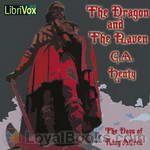 The Dragon and the Raven
The Dragon and the Raven
During the reign of King Alfred, Danish forces have invaded the English countryside. Although the English try to repulse these attacks, they are overrun by the savagery and sheer numbers of the Danes.One of those deeply touched by these attacks is young Edmund. As a boy, he watched as his father was slain in battle fighting the Danes. Although young, he was intelligent, and noted the mistakes made on the battlefield. As he grew into a man, he put that knowledge into use and created a uniquely trained group of soldiers and built a new, stronger ship called the Dragon... | |
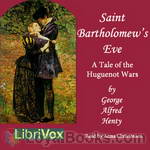 St. Bartholomew's Eve
St. Bartholomew's Eve
Set in the days of the religious wars of Europe, St. Bartholomew’s Eve is the tale of the Huguenot’s desperate fight for freedom of worship in France. As the struggle intensifies the plot thickens, culminating in the dreadful Massacre of St. Bartholomew’s Eve. Henty, “The Boy’s Own Storyteller” weaves the life and adventures of Philip Fletcher and his cousin, Francois DeLaville, into the historical background with thrilling battles, sieges and escapes along the way (not to mention a fair damsel in distress!). | |
 The Tiger of Mysore
The Tiger of Mysore
During the Indian war with Tippoo Saib, 15 year old Dick Holland and his mother set out from England to find and rescue his father, shipwrecked 6 years earlier, and believed to be held prisoner by the 'Tiger of Mysore'. | |
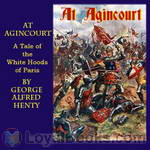 At Agincourt - White Hoods of Paris
At Agincourt - White Hoods of Paris
The story begins in a grim feudal castle in Normandie. The times were troublous, and soon the king compelled Lady Margaret de Villeroy, with her children, to go to Paris as hostages. Guy Aylmer went with her.Paris was turbulent. Soon the guild of the butchers, adopting white hoods as their uniform, seized the city, and besieged the house where our hero and his charges lived. After desperate fighting, the white hoods were beaten and our hero and his charges escaped from the city, and from France. (Summary from the original back cover) | |
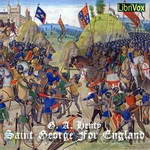 St George for England
St George for England
A tale set in England in the time of Cressy and Pointiers. A child of noble birth whose parents have fallen foul of the current royalty is taken by his dying mother and placed in hiding. He grows up with a bowyer and then apprenticed to an armourer just outside the gates of the City of London, becomes accomplished in arms and joins the campaign in France.A tale of heroism and 14th century viciousness. Great fun. | |
 By Pike and Dyke
By Pike and Dyke
It is the 1570's, and the people of the Netherlands live in terror under the cruel dominion of Spain. Though many long to be free of Spanish tyranny, efforts at rebellion are failing, and allies are nowhere to be found. Edward “Ned” Martin, son of an English captain and a Dutch lady, is thrust into the conflict when he resolves to help his mother’s people and avenge his murdered relatives. Entering the service of the revolutionary leader William the Silent, Prince of Orange, Ned is called upon to carry out dangerous secret missions deep within occupied territory... | |
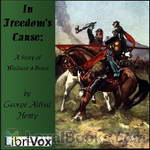 In Freedom's Cause
In Freedom's Cause
Another stirring tale from the master of historical fiction set in the time of Robert Bruce and William Wallace and their struggle for Scotland's independence. | |
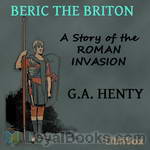 Beric the Briton - A Story of the Roman Invasion
Beric the Briton - A Story of the Roman Invasion
My series of stories dealing with the wars of England would be altogether incomplete did it not include the period when the Romans were the masters of the country. The valour with which the natives of this island defended themselves was acknowledged by the Roman historians, and it was only the superior discipline of the invaders that enabled them finally to triumph over the bravery and the superior physical strength of the Britons. The Roman conquest for the time was undoubtedly of immense advantage to the people -- who had previously wasted their energies in perpetual tribal wars -- as it introduced among them the civilization of Rome... | |
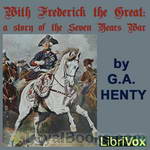 With Frederick The Great: A Story of the Seven Years' War
With Frederick The Great: A Story of the Seven Years' War
Among the great wars of history there are few, if any, instances of so long and successfully sustained a struggle, against enormous odds, as that of the Seven Years' War, maintained by Prussia--then a small and comparatively insignificant kingdom--against Russia, Austria, and France simultaneously, who were aided also by the forces of most of the minor principalities of Germany. The population of Prussia was not more than five millions, while that of the Allies considerably exceeded a hundred millions... | |
 With Clive in India
With Clive in India
With Clive in India gives a vivid picture of the wonderful events of the ten years, which at their commencement saw Madras in the hands of the French--Calcutta at the mercy of the Nabob of Bengal--and English influence apparently at the point of extinction in India--and which ended in the final triumph of the English, both in Bengal and Madras. There were yet great battles to be fought, great efforts to be made, before the vast Empire of India fell altogether into British hands; but these were but the sequel of the events described. | |
 Young Carthaginian
Young Carthaginian
Typically, Henty's heroes are boys of pluck in troubled times, and this is no different. Detailed research is embellished with a vivid imagination, especially in this novel set in the Punic wars, about which knowledge is limited: "...certainly we had but a hazy idea as to the merits of the struggle and knew but little of its events, for the Latin and Greek authors, which serve as the ordinary textbooks in schools, do not treat of the Punic wars. That it was a struggle for empire at first, and latterly... | |
 With Lee in Virginia
With Lee in Virginia
Vincent Wingfield is the son of a wealthy Virginian planter. When the country goes to war, he enlists in the cavalry, and sees action under the various generals commanding the army in and near Virginia. He has several private adventures as well, including a personal enemy, prison escape, rescue of a young lady, spying expedition, and recovery of a stolen slave. He rises in rank in the Confederate army, and after the war is over, he marries and returns home to manage his mother's plantation. Henty in this book gives an overview of the causes of the Civil War, and follows the battles and movements of the army in Virginia and the surrounding area... | |
 Under Drake's Flag: A Tale Of The Spanish Main
Under Drake's Flag: A Tale Of The Spanish Main
An exciting tale set on the high seas, in a period ruled by exploration, with the ever-present dangers of nature and the weather, together with pirates of the famed Spanish Main. | |
 No Surrender! A Tale of the Rising in La Vendee
No Surrender! A Tale of the Rising in La Vendee
| |
 In the Reign of Terror: The Adventures of a Westminster Boy
In the Reign of Terror: The Adventures of a Westminster Boy
Like all Henty books, this one centers around a young English lad whose courtesy and courage win the day. Harry Sandwith travels to France to serve a French Marquis, despite the rumblings of a revolution. Follow along to benefit from a wholesome story full of historical facts in good, old Henty fashion. (Introduction by Jenn Raimundo) | |
 At Aboukir and Acre A Story of Napoleon's Invasion of Egypt
At Aboukir and Acre A Story of Napoleon's Invasion of Egypt
| |
 With Lee in Virginia A Story of the American Civil War
With Lee in Virginia A Story of the American Civil War
| |
 Condemned as a Nihilist A Story of Escape from Siberia
Condemned as a Nihilist A Story of Escape from Siberia
| |
 Through Three Campaigns A Story of Chitral, Tirah and Ashanti
Through Three Campaigns A Story of Chitral, Tirah and Ashanti
| |
 A Jacobite Exile Being the Adventures of a Young Englishman in the Service of Charles the Twelfth of Sweden
A Jacobite Exile Being the Adventures of a Young Englishman in the Service of Charles the Twelfth of Sweden
| |
 With Wolfe in Canada The Winning of a Continent
With Wolfe in Canada The Winning of a Continent
| |
 By England's Aid or the Freeing of the Netherlands (1585-1604)
By England's Aid or the Freeing of the Netherlands (1585-1604)
| |
 Held Fast For England A Tale of the Siege of Gibraltar (1779-83)
Held Fast For England A Tale of the Siege of Gibraltar (1779-83)
| |
 Orange and Green A Tale of the Boyne and Limerick
Orange and Green A Tale of the Boyne and Limerick
| |
 Rujub, the Juggler
Rujub, the Juggler
| |
 A Girl of the Commune
A Girl of the Commune
| |
 A Chapter of Adventures
A Chapter of Adventures
| |
 By England's Aid Or, the Freeing of the Netherlands, 1585-1604
By England's Aid Or, the Freeing of the Netherlands, 1585-1604
| |
By: George Alfred Townsend (1841-1914) | |
|---|---|
 Campaigns of a Non-Combatant, and His Romaunt Abroad During the War
Campaigns of a Non-Combatant, and His Romaunt Abroad During the War
| |
By: George Arbuthnot (1836-1912) | |
|---|---|
 Herzegovina Or, Omer Pacha and the Christian Rebels
Herzegovina Or, Omer Pacha and the Christian Rebels
| |
By: George Augustus Selwyn (1719-1791) | |
|---|---|
 George Selwyn: His Letters and His Life
George Selwyn: His Letters and His Life
| |
By: George B. Griffenhagen | |
|---|---|
 Drug Supplies in the American Revolution
Drug Supplies in the American Revolution
| |
By: George B. Grinnell | |
|---|---|
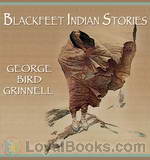 Blackfeet Indian Stories
Blackfeet Indian Stories
The Blackfeet were hunters, travelling from place to place on foot. They used implements of stone, wood, or bone, wore clothing made of skins, and lived in tents covered by hides. Dogs, their only tame animals, were used as beasts of burden to carry small packs and drag light loads. The stories here told come down to us from very ancient times. Grandfathers have told them to their grandchildren, and these again to their grandchildren, and so from mouth to mouth, through many generations, they have reached our time. (Sibella Denton) | |
By: George Bancroft (1800-1891) | |
|---|---|
 Memorial Address on the Life and Character of Abraham Lincoln Delivered at the request of both Houses of Congress of America
Memorial Address on the Life and Character of Abraham Lincoln Delivered at the request of both Houses of Congress of America
| |
By: George Berkeley (1685-1753) | |
|---|---|
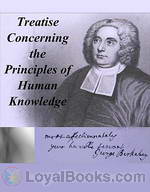 A Treatise Concerning the Principles of Human Knowledge
A Treatise Concerning the Principles of Human Knowledge
A Treatise Concerning the Principles of Human Knowledge, Part 1 (Commonly called “Treatise” when referring to Berkeley’s works) is a 1710 work by the Irish Empiricist philosopher George Berkeley. It largely seeks to refute the claims made by his contemporary John Locke about the nature of human perception. Both Locke and Berkeley agreed that there was an outside world, and it was this world which caused the ideas one has within one’s mind. Berkeley sought to prove that the outside world was also composed solely of ideas, suggesting that “Ideas can only resemble Ideas”... | |
By: George Bethune English (1787-1828) | |
|---|---|
 A Narrative of the Expedition to Dongola and Sennaar
A Narrative of the Expedition to Dongola and Sennaar
As a second lieutenant in the United States Marine Corps during the War of 1812 assigned to Marine Corps headquarters, English sailed to the Mediterranean, and was among the first citizens of the United States known to have visited Egypt. Shortly after arriving in Egypt he resigned his commission, converted to Islam and joined Isma'il Pasha in an expedition up the Nile River against Sennar in 1820, winning distinction as an officer of artillery. He published his Narrative of the Expedition to Dongola and Sennaar (London 1822) regarding his exploits. (Introduction adapted by obform from Wikipedia) | |
By: George Bird Grinnell (1849-1938) | |
|---|---|
 Blackfoot Lodge Tales The Story of a Prairie People
Blackfoot Lodge Tales The Story of a Prairie People
| |
By: George Brannon | |
|---|---|
 Brannon's Picture of The Isle of WightThe Expeditious Traveller's Index to Its Prominent Beauties
Brannon's Picture of The Isle of WightThe Expeditious Traveller's Index to Its Prominent Beauties
| |
By: George Broke (1861-1932) | |
|---|---|
 With Sack and Stock in Alaska
With Sack and Stock in Alaska
In 1888, George Broke with Harold Topham and William Williams, made the first exploration of the Alaskan Mt. St. Elias range, including the crossing of the great Malaspina Glacier and an attempt on the S.E. face of Mt. St. Elias itself. The journey is described in the interesting work With Sack and Stock in Alaska, vividly detailing the country visited and the characters met along the way. - Summary by Fritz | |
By: George Bryce (1844-1931) | |
|---|---|
 The Romantic Settlement of Lord Selkirk's Colonists The Pioneers of Manitoba
The Romantic Settlement of Lord Selkirk's Colonists The Pioneers of Manitoba
| |
 The Mound Builders
The Mound Builders
| |
By: George Cary Eggleston (1839-1911) | |
|---|---|
 Strange Stories from History for Young People
Strange Stories from History for Young People
| |
 Captain Sam The Boy Scouts of 1814
Captain Sam The Boy Scouts of 1814
| |
By: George Cooreman (1852-1926) | |
|---|---|
 Martyrdom Of Belgium; Official Report Of Massacres Of Peaceable Citizens, Women And Children By The German Army; Testimony Of Eye-Witnesses
Martyrdom Of Belgium; Official Report Of Massacres Of Peaceable Citizens, Women And Children By The German Army; Testimony Of Eye-Witnesses
The title says it all. World War I narratives of German activities in Belgium after the German invasion of this neutral country. - Summary by david wales | |
By: George D. Wolf (1923-) | |
|---|---|
 The Fair Play Settlers of the West Branch Valley, 1769-1784 A Study of Frontier Ethnography
The Fair Play Settlers of the West Branch Valley, 1769-1784 A Study of Frontier Ethnography
| |
By: George Davidson | |
|---|---|
 The Incomparable 29th and the "River Clyde"
The Incomparable 29th and the "River Clyde"
| |
By: George Dunderdale (1822-1903) | |
|---|---|
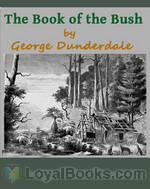 The Book of the Bush
The Book of the Bush
While the world was young, nations could be founded peaceably. There was plenty of unoccupied country, and when two neighbouring patriarchs found their flocks were becoming too numerous for the pasture, one said to the other: "Let there be no quarrel, I pray, between thee and me; the whole earth is between us, and the land is watered as the garden of Paradise. If thou wilt go to the east, I will go to the west; or if thou wilt go to the west, I will go to the east." So they parted in peace.(excerpt from book) | |
By: George Edmund Haynes (1880-1960) | |
|---|---|
 The Negro at Work in New York City A Study in Economic Progress
The Negro at Work in New York City A Study in Economic Progress
| |
By: George Edmundson (1848-1930) | |
|---|---|
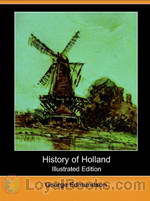 History of Holland
History of Holland
The title, “History of Holland,” given to this volume is fully justified by the predominant part which the great maritime province of Holland took in the War of Independence and throughout the whole of the subsequent history of the Dutch state and people. | |
By: George Eliot (1819-1880) | |
|---|---|
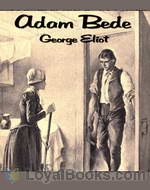 Adam Bede
Adam Bede
A young carpenter falls in love with the village beauty. She, however, has set her sights on a dashing army captain who's the son of the wealthy local squire. Meanwhile, a beautiful and virtuous young woman preacher arrives in the village. What happens to these people and the strange twists and turns that their lives take are described in the rest of the book. Adam Bede was George Eliot's first published novel. Published in 1859, the book has remained a firm favorite with readers and academicians alike and is still taught in many English literature courses all over the world... | |
 The Mill on the Floss
The Mill on the Floss
The novel details the lives of Tom and Maggie Tulliver, a brother and sister growing up on the river Floss near the village of St. Oggs, evidently in the 1820’s, after the Napoleonic Wars but prior to the first Reform Bill (1832). The novel spans a period of 10-15 years, from Tom and Maggie’s childhood up until their deaths in a flood on the Floss. The book is fictional autobiography in part, reflecting the disgrace that George Eliot (Mary Ann Evans) herself had while in a lengthy relationship with a married man, George Henry Lewes... | |
By: George Ernest Morrison (1862-1920) | |
|---|---|
 An Australian in China Being the Narrative of a Quiet Journey Across China to Burma
An Australian in China Being the Narrative of a Quiet Journey Across China to Burma
| |
By: George Fraser Black (1866-1948) | |
|---|---|
 Scotland's Mark on America
Scotland's Mark on America
| |
By: George Frisbie Hoar (1826-1904) | |
|---|---|
 Autobiography of Seventy Years, Vol. 1-2
Autobiography of Seventy Years, Vol. 1-2
| |
By: George G. (George Gallie) Nasmith (1877-1965) | |
|---|---|
 On the Fringe of the Great Fight
On the Fringe of the Great Fight
| |
By: George Gillespie (1613-1648) | |
|---|---|
 The Works of Mr. George Gillespie (Vol. 1 of 2)
The Works of Mr. George Gillespie (Vol. 1 of 2)
| |
By: George Gissing (1857-1903) | |
|---|---|
 By the Ionian Sea Notes of a Ramble in Southern Italy
By the Ionian Sea Notes of a Ramble in Southern Italy
| |
By: George H. Devol (1829-1903) | |
|---|---|
 Forty Years a Gambler on the Mississippi
Forty Years a Gambler on the Mississippi
| |
By: George H. Pettis (1834-) | |
|---|---|
 Frontier service during the rebellion or, A history of Company K, First Infantry, California Volunteers
Frontier service during the rebellion or, A history of Company K, First Infantry, California Volunteers
| |
By: George Hamilton | |
|---|---|
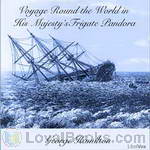 Voyage Round the World in His Majesty's Frigate Pandora
Voyage Round the World in His Majesty's Frigate Pandora
George Hamilton was the surgeon assigned to the frigate Pandora. The British Admiralty ordered the ship to the Pacific to arrest the Bounty mutineers and bring them back to England for trial. The commander, Captain Edward Edwards, also was ordered to chart the passage between Australia and New Guinea. While Edwards managed to arrest the mutineers still on Tahiti, he sank the Pandora on a reef near Australia. Hamilton tells this story and also the story of the crew’s fate after the Pandora sank. | |
By: George Hamlin Fitch (1852-1925) | |
|---|---|
 Modern English Books of Power
Modern English Books of Power
| |
 The Critic in the Orient
The Critic in the Orient
| |
By: George Hart (1839-1891) | |
|---|---|
 The Violin Its Famous Makers and Their Imitators
The Violin Its Famous Makers and Their Imitators
| |
By: George Henry Makins (1853-) | |
|---|---|
 Surgical Experiences in South Africa, 1899-1900 Being Mainly a Clinical Study of the Nature and Effects of Injuries Produced by Bullets of Small Calibre
Surgical Experiences in South Africa, 1899-1900 Being Mainly a Clinical Study of the Nature and Effects of Injuries Produced by Bullets of Small Calibre
| |
By: George Henry Miles (1824-1871) | |
|---|---|
 The Truce of God A Tale of the Eleventh Century
The Truce of God A Tale of the Eleventh Century
| |
By: George Herbert Fosdike Nichols | |
|---|---|
 Pushed and the Return Push
Pushed and the Return Push
| |
By: George Hodges (1856-1919) | |
|---|---|
 William Penn
William Penn
| |
By: George L. Apperson (1857-1937) | |
|---|---|
 The Social History of Smoking
The Social History of Smoking
This work tells the history of smoking in England from the social point of view. Thus it does not deal with the history of tobacco growing or tobacco related manufacture, but is rather the story of how smoking has fitted in with the fashions and customs throughout the ages, and the changes in the attitude of society towards smoking. | |
By: George Lunt (1803-1885) | |
|---|---|
 Old New England Traits
Old New England Traits
| |
By: George Lynch (1868-1928) | |
|---|---|
 Impressions of a War Correspondent
Impressions of a War Correspondent
| |
By: George M. (George Makepeace) Towle (1841-1893) | |
|---|---|
 The Nation in a Nutshell
The Nation in a Nutshell
| |
By: George MacDonald (1824-1905) | |
|---|---|
 St. George and St. Michael
St. George and St. Michael
| |